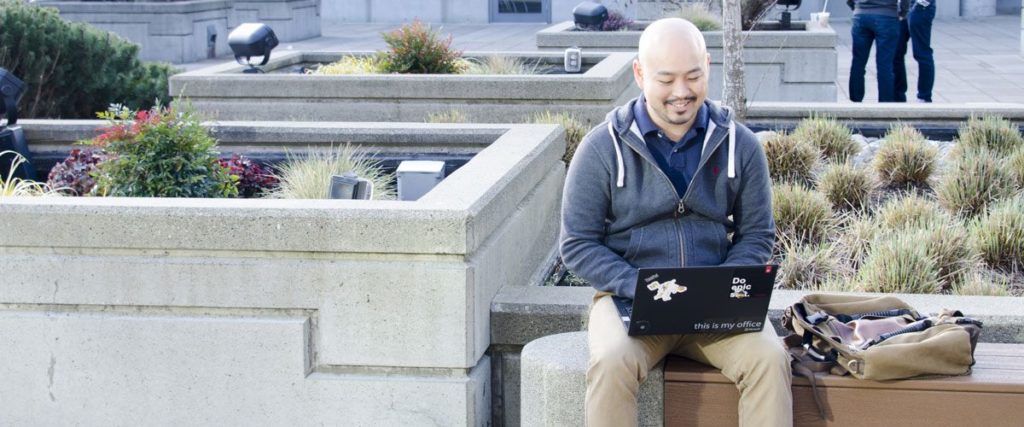In their own voice: Applying military skills at Microsoft
Anthony Seo
Current Title: Software engineer for Windows
Former Title: Sergeant, Marine Corps
People talk about joining the military and seeing the world — I actually got to do that. I got to go to Japan, to Korea. I saw the Great Wall in China, the beautiful beaches of Boracay, Philippines — thanks to the Marine Corps. I spent my 12 years in the Marines working as a human intelligence specialist for counterintelligence, which meant I met with individuals and collected information that would be useful, whether that was the location of threats or just what would make the community better. That role took me to locations across the globe, which was one of my main benefits of joining the military.

I also took full advantage of the education benefit. It took me 12 years to do it, but I did end up getting a bachelor’s degree in business administration before I left the Marine Corps. As I was nearing my separation date, and still working toward that degree, I found out about Microsoft Software & Systems Academy (MSSA). During a briefing, somebody from MSSA spoke to our unit. I’d actually always wanted to be a software engineer; that was the plan until I ended up joining the Marines. So when this opportunity came up at the end of my Marine Corps career, it felt like a second chance to pursue what I really wanted to do. It was like I could hear the angels singing! I felt like they were talking directly to me, and I had to seize the opportunity. I made sure that I was going to be in that program.
I was taking about two college courses at the same time I was attending MSSA, so I didn’t get a lot of sleep for those 16 weeks. But I was very focused — if I wasn’t in school or in class, I was in the library. And if the library was closed, I was at home studying. It almost felt like a deployment. That’s one of the advantages of having deployed places before, I had the mindset and focus that it takes to really be successful in a short amount of time. And my wife was incredibly supportive; she knew how important it was for me to both earn my bachelor’s degree and successfully complete MSSA, so she supported me 100 percent.
Training for a high-tech career pays off for former Marine sergeant
Just like any company, the military is focused on retention, on keeping guys in the military as long as possible; they’re not typically going to go out of their way to make sure that service members have skills they can turn around and take to a different company. There really was a need for somebody to take skills that are very military-specific, and convert them into something sellable to other companies. Service members have a lot of traits and characteristics that are very valuable to companies. MSSA is groundbreaking in that it really helps service members recognize those skills that they bring to the table. They’re dedicated, they’re focused, they’re driven, they never take no for an answer — these are the kinds of people you want in your company.
My goal after graduating from MSSA was to work at Microsoft. I’d researched it and everything about the company, from the culture to the mission, resonated with me. My MSSA mentors were also really great, and they all enjoyed working for Microsoft, so I knew it would be a good fit. When I found out I got the job at Microsoft, I felt so lucky. I worked really hard, the right opportunity presented itself, and I was ready for it. I was ready for the challenge and the first step in my new career.
So much of what I did as a Marine applies to my job here at Microsoft. As a counterintelligence specialist, I deployed to some not-so-great locations in Afghanistan, where I had to think on my feet and figure things out quickly. I was constantly problem-solving — if you weren’t able to solve the problems, you weren’t able to do your job, and if you weren’t able to do your job, people’s lives were on the line. So you figured out how to get rid of obstacles that were in your way. I still have that same mindset here at Microsoft, and I think that my co-workers appreciate it. They’ve commented that I might not know how to do a certain task or know the answer at that exact moment, but I won’t stop until I do. Whether it’s going through textbooks, or finding the right person to help answer my question, or searching the Internet, I’m going to keep working through it until I figure it out. That’s the kind of mindset a lot of military folks bring to Microsoft.
Service members sometimes have low confidence in what their skills and talents are — they don’t feel confident they can get the kind of jobs that their civilian college graduate counterparts can get. But those of us that have come to Microsoft are excelling beyond what we even thought possible. I’m doing way more than I thought I was able to do, and it’s because a lot of things we do here are things we did in the military: solving problems, completing tasks, taking things one step at a time until, eventually, you get a great product. So I tell service members, “Have more confidence in yourself. You can do this — you’re valuable to the corporate world, you’re valuable to Microsoft, and you can do well here if you just believe in yourself.”

